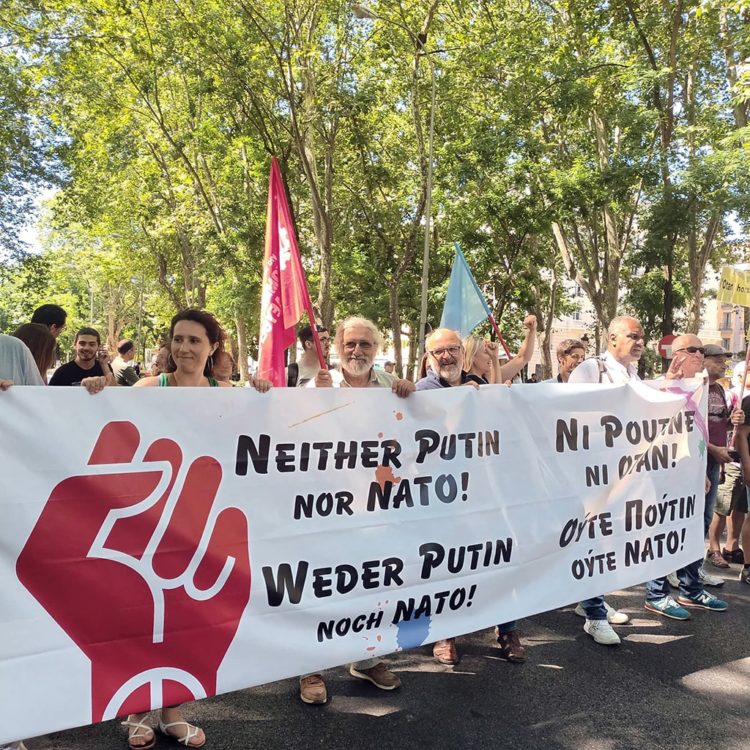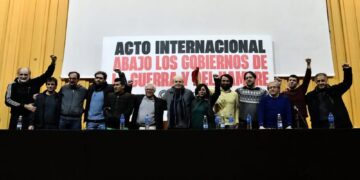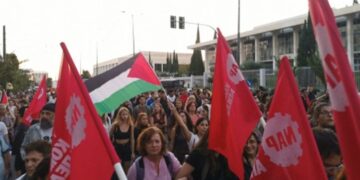New Left Current
Against the US-NATO-EU-Russia war plans in the region
Struggle for the peace of the peoples in the new era of capitalist warfare
Weapons in human history have never been silenced. In many places of the world soldiers, mercenaries and civilians are killed in just or unjust wars, under sacred or false flags. But between wars, we are conventionally accustomed to distinguishing the “big” wars. In modern history, the “Great War” (World War I) and World War II, linked to the defeat of Nazism, stand out. In this context, in the everyday language but also in that of historians and other scholars, our time is defined as “post-war”. That is, an era “after” the last great war.
The Russian invasion of Ukraine, that is the war of a huge country that is a military superpower and with the largest nuclear arsenal in the world, at the expense of a very large country of about 45 million people in Europe, undoubtedly puts us in a new era.
We must “read” the new times correctly. The “sudden” declaration by Germany for an armaments program of 100 billion, the “tsunami” of corresponding decisions of all NATO and EU countries, the competition of accusations for which countries “spend little on military expenses” or “hesitate to take military action” , together with the Russian leadership ‘s open reference to the use of nuclear weapons, mark a turning point in modern history. With horrific images of war, deaths and refugees from Ukraine being added to the long chain of those in Yugoslavia, Iraq, Libya, Syria, Yemen and elsewhere, millions of people around the world are getting used to the idea. of the preparation that we are entering a “pre-war” era, in the sense of a new great war
Did something happen and Putin went “crazy”? Psychiatrists, physiognomists and other “experts” conduct analyzes. The explanation of the greatest wars in terms of “madness” or “tragic mistakes of leaders” is very common with perhaps more emblematic the reduction of World War II to “Hitler’s mental imbalance”.
Marxism, however, focuses on the objective contradictions that form in real – and always dynamic – economic and political life, its evolution at the national and international level, its connection with the interests of social classes and their struggle.
We must remember a key position of Rosa Luxemburg while the Great War was raging:
“Imperialist politics is not the work of one country or group of countries. It is the product of the global evolution of capitalism at a given moment of its maturation. It is by its very nature an international phenomenon, an indivisible whole that we can only understand within the mutual relations from which no country could be excluded.” Therefore, it is wrong to try to explain what is happening, with unilateral analyses and references to the choices of individuals, governments or even countries, considering them separately and in detachment from what constitutes modern capitalism and its contradictions, which objectively encompass all countries.
There is no major crisis associated with war, much less in the age of capitalism, which does not have as a decisive background the competition of different poles of the exploiting classes within a country and powerful capitalist states / organizations internationally and at the same time does not form opposing internal dynamics of exploited and oppressed classes and strata. The background of the war hysteria and wars of the present period is the sharpest capitalist rivalries, especially as they coexist with economic difficulties and critical elements of modern capitalism. They meet the many aspects of a universal crisis and the emergence of contradictions of the social model of exploitation. , as evidenced by the catastrophic failure to deal with the pandemic, the environmental crisis, the deadlocked and destructive approach to energy crisis etc. Of particular importance in our case is the competition for gas pipelines in Europe and in general the competition for energy, in conditions of climate change as a product of capitalist development and the inclusion of nature in the capitalist market.
To have a clear picture of the real causes of the war in Ukraine, we must remember the Nordstrem II Pipeline made jointly by Russia and Germany, the US statement that they will never allow it to operate, but also the huge investments in liquefied natural gas (LNG) infrastructure in the US, which aim not only to hit Russia financially and strategically, but also to make Europe a more loyal ally but also a weak customer. In short: We have a war of pipelines, a war of markets, a war of capital and their competition.
The war will bring disasters to the world capitalist economy in addition to the suffering of the peoples, but the destruction of productive forces and infrastructure in Ukraine also gives opportunities for “development” to those who will undertake reconstruction, while the profits of military-industrial complex of a number of countries and several multinationals will also soar. Many developments show that things are getting out of control, as there is now a question of changing the “ruler” in the international capitalist grid.
On the one hand, in terms of geo-economy, the tendency is for the US and the “West” to lose their primacy over emerging China and Asia. China’s share of world GDP from 3.4% in 1990 is expected to reach 21.4% in 2024. Respectively, the share of the US and Europe from 41.2% is expected to reach 28.2% in 2024. The reversal trend is clear. 20 years ago, Chinese products were synonymous with low quality Today they are identified with 5G technology and Huawei. In terms of purchasing power, China is already the first economic power in the world, while in a few years this is expected to happen in terms of nominal GDP.
On the other hand, at the military and geopolitical levels, hegemony and supremacy clearly belong not just to the West but predominantly to the United States. US military spending was in 2020, three times that of China and 13 times that of Russia. The US has 750 military bases in 80 countries around the world, while Russia can only roar around its “neighborhood”, while it has only one base outside the territory of the former USSR in Syria.
In the big world picture, the US, NATO and the EU are using the military advantage to offset China’s economic rise and the Sino-Russian axis. In this big picture, an essential element is the NATO encirclement of Russia, as well as that of China in the Pacific. In Europe, at the geopolitical, geo-economic and military levels, the US is also moving very actively and trying to gain extra positions. They want to reach in a breath’s distance from Russia with the ability to destroy it, to break the axis of common trade-business interest of Russia-Germany in the field of energy, to unite big and small allies, together with puppet governments like the one in Ukraine in the context of continuous NATO expansion, but also the need for the US to transfer forces to the Pacific. Greece is an integral part of the US-NATO-EU offensive axis. The hosting of US bases is an objectively military target of Russia.
The rise of Russia’s power in what it considers to be its imperial “backyard” is not just about its “neighborhood.” It aspires, not to “restore the USSR”, but the glory and power of the Russian Empire in the role of a powerful world nuclear power, a goal that could only be claimed in conjunction with its support for China’s economic growth. Russia alone is economically weak with a GDP equal to that of South Korea or half of Italy, but it is anything but an insignificant country. It has major reserves of mineral resources (energy and metals). It is a military and nuclear superpower that relies at the same time – almost exclusively and this is a disadvantage – on the sale of energy resources, as well as weapons and military technologies. If China has mainly the weapon of investment in Africa, Latin America but also in Europe ( COSCO), the dependence of India, Turkey and Brazil – big economies and US allies – on Russian weapons or military technologies , is by no means a trivial factor. The heavily formed Russian-Chinese axis, based among other things on the combination of old and new labor exploitation methods in China, but also the deprivation of basic political rights of the working class, has the potential and a clear pursuit to form a new hegemonic axis to replace and defeat the United States. How do we stand up to this deadly competition? The worst advisor is the one who indicates the acceptance of the TINA (There is no alternative) logic. In this context, assuming that the war of markets, pipelines and the formation of spheres of influence, the “only” option is to choose the side of one or the other pole of capitalist competition. Thus, there are even forces that speak in the name of Marxism, blaming Russia almost exclusively for what is happening by disguising the offensive strategy of the US and NATO, while others want to see on the Russian side either a continuation of the USSR and Red Army (at a time when the current Russian leadership is aiming for “de-communization”), or even the “useful” ally for the defeat of the USΑ and imperialism.
In real life, things are different: The war in Ukraine, is uprooting thousands, wreaking havoc and devastation, costing the lives of soldiers, while offering a victory to US strategy. This is shown by the NATO rallynig, but also by the fact that now the squares around the world, in contrast to the 90s and the wars in Iraq, are filled – often with open patronage by bourgeois governments and mechanisms – with Russophobia and hymns to ” West of democracy and freedom “.
Entering the new “pre-war” era, requires a review of political and theoretical tools, a “specific analysis of the specific situation”, but also a reflection on the very “terminology” and “grammar” that is not without significance. The detachment of the Leninist analysis of imperialism from its essence which is the reactionary maturation of capitalism and the deadly development of competition within it, the identification of imperialist policy with that of the current ruler-the USA alone, but also the understanding of capitalism exclusively in the form of a specific neoliberal model of the West, all have as consequences political perplexity, weak predictability and ultimately problematic attitudes
We observe something that seems paradoxical, but in the end it is not: As much as some currents of the Left are willing to declare their willingness to support a war (supporting the “lesser evil”) and to slander the struggle for a just peace for the peoples, so they are willing to renounce class struggle and support class peace, promoting the goal of “productive reconstruction” and admiring the “productive” capitalism of China and Asia in general
The crucial issue is the formation of a massive, international, independent “coalition” of peoples that will threaten the war strategy, without interfering with any pole of the war. If it does not exist with a distinct, militant, revolutionary spirit, then the tactical answers will prove to be suicidal, at least unable to affect developments, as it will be captured under false flags. More generally, the great question is the independence of workers’ politics and the communist response as a whole for humanity today, for all the great issues of our time, from labour to the environmental crisis, from democracy to the coexistence of peoples, in search of a new round of socialism / communism, against the context of violence and necrophilia, war and destruction inherently constituted by capitalism. There are “tough” political and theoretical conditions for this direction, which will be judged through the active presence of communists in the field of direct political struggle, which can only focus on the struggle for the disengagement of Greece from the war, the removal of US military bases, the withdrawal from NATO and the cancellation of military armaments programs launched by the current New Democracy government, as well as the previous SYRIZA one. More generally, in Europe, the left must raise, on the one hand, the issue of the dissolution of imperialist organizations such as NATO and the EU, and, on the other hand, in each country, to raise the issue of their immediate withdrawal from NATO and the EU.


















